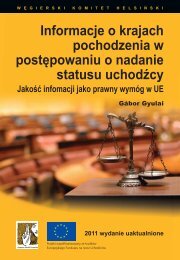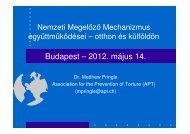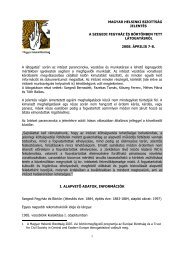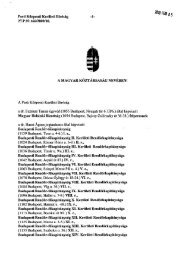English
English
English
You also want an ePaper? Increase the reach of your titles
YUMPU automatically turns print PDFs into web optimized ePapers that Google loves.
Basic Standard The Compulsory Use of COISimply considered, there are just two issues. First, could the applicant’s story have happened,or could his or her apprehension come to pass, on their own terms, given what we know fromavailable country of origin information? Secondly, is the applicant personally believable? Ifthe story is consistent with what is known about the country of origin, then the basis for theright inferences has been laid.In IE-04 (2001), the Court went further and set a clear obligation of consideringCOI when holding that 36[The Minister] must have regard to relevant background material on the applicant’s countryof nationality.In addition to setting such a general standard, the Irish High Court in IE-06 (2001)also established a clear link between COI and the assessment of “personal credibility”(already referred to as an issue of central importance in IE-03):It is clear that a knowledge of conditions in the applicant’s country of origin is an importantelement in assessing the applicant’s credibility.Fairly clear guidance was provided on the above in a later judgment (IE-14) from2005:[...] it is incumbent on the Tribunal Member to refer to available country of origin informationwhere this is possible and where such country of origin information may be relevant to theassessment of credibility, and further that it is not sufficient to make what has been describedas a bald statement that the applicant lacks credibility. Further, the fact that the TribunalMember does not find certain minor matters, or matters not central to the core issues, to becredible, is insufficient to found an adverse finding of credibility generally in order to refuse adeclaration.With the above decision, the Irish High Court set an exemplary precedent on howto base credibility assessment on factual considerations and related it to relevant factorsusing country information, as such avoiding an isolated analysis of personal believablenessas an “abstract” matter. This issue was addressed from a different perspective in IE-15,where the judge held that without detracting from the force to be given to the generalstandard already set by both UK and Irish jurisprudence, it[...] could not be extended to mean that in every case no matter how unbelievable theapplicant is found to be on the “pure credibility” issue, the Tribunal Member must indulge ina pointless exercise, namely looking at amounts of country of origin information [...]. Suchinformation, especially given the finding in respect of which leave was refused as to credibility,could not add anything of real relevance with a capacity to influence the assessment of overallcredibility in the present case.The same argumentation can be found in IE-20. Reading in balance these judgmentsone can conclude that according to the Irish High Court it is mandatory to use COI incredibility assessment and base related decisions thereon. It is however useless to engagein lengthy COI research and analysis when an applicant is manifestly lacking in personalcredibility.36See also IE-07 and IE-08 for further reference27







